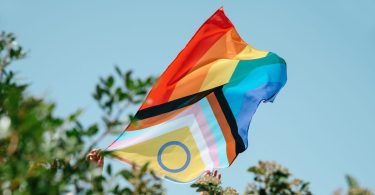With time and tolerance, the many accomplishments and contributions of Black lesbian, gay, bisexual, transgender and queer (LGBTQ) people have come to be recognized and revered as part of Black History Month. Yet there are still many more stories left untold.
They are writers, singers, dancers and activists, teachers, tastemakers, entertainers and political pioneers who dared and—in many cases—made an indelible impact on Black culture and the world as we know it. Here we invite you to say their names, and celebrate their contributions.
Born Aug. 24, 1945, Marsha P. Johnson is known as the “Mother” of the American gay liberation and “ Mayor of Christopher Street” in New York City. A founding member of the Gay Liberation Front (GLF) and the Street Transvestite Action Revolutionaries activist group, Johnson is credited as the person who “threw the first brick” that started the Stonewall uprising of 1969—a political fight for equality that has evolved into today’s LGBTQ Rights Movement.
Born in Springfield, Illinois, on July 23, 1899, Ruth Charlotte Ellis lived to be 101 and helped many people in her years on this earth. She is considered to be one of the first out lesbians, reportedly coming out in 1915, and her work helping homesless and at-risk LGBTQ youth is immortalized at the <a class="sc-1out364-0 dPMosf sc-145m8ut-0 kMzRIQ js_link" data-ga="[["Embedded Url","External link","https://www.ruthelliscenter.org/", Ernestine Eckstein
Ernestine Eckstein (April 23, 1941 – July 15, 1992) was a prominent figure adn activist in the Lesbian and Gay rights movement and the Civil Rights movement during the 1960s and the Civil Rights movement. She worked alongside activists Phyllis Lyon and Del Martin, Barbara Gittings, Franklin Kameny, and Randy Wicker, and she is remembered as one of the forefront figures of the black feminist movement.
Miss Major Griffin-Gracy served as the first executive director for the Transgender Gender Variant Intersex Justice Project. Her advocacy for LGBTQ rights is known nationwide and still celebrated today. And even into her 80s today, she hasn’t slowed down her activism.
“I’m still fucking here,” she proclaimed in a June 2023 interview with the Guardian, conducted at her home in Arkansas. And we are here for her.
Audre Lorde described herself “Black, lesbian, feminist, socialist, mother, warrior, poet,” and her work and writing centered on confronting injustice and tearing down systems of oppression. Among her most famous published works include the “biomythography” work, “Zami: A New Spelling of My Name” (1982), “Sister Outsider” (1984), and her posthumously released collection of essays and poems, “Your Silence Will Not Protect You” (2017).
Additionally, “The Berlin Years: 1984–1992″ chronicled Lorde’s initiative to help Afro-Germans establish identities for themselves in Germany outside of discrimination.
Lorde was a force not to be reckoned with. Although she died young of cancer at age 58 in 1992, she left a plethora of powerful intellectual work in her wake that is still studied today.
Born on December 24, 1920, Stormé DeLarverie could pass for Black or white, male or female, activist and auteur. From New Orleans to New York City, DeLarverie performed at the Apollo Theater, Radio City Music Hall, worked as a bouncer, an MC, and was well known as the “guardian of lesbians” in Manhattan’s West Village. In fact, it was allegedly her scuffle with a police officer that led to the Stonewall uprising against the treatment of LGBTQ people by police—which also earned her the moniker, “the Rosa Parks of the gay community.”
“It was a rebellion, it was an uprising, it was a civil rights disobedience,” she said in an interview about Stonewall. “It wasn’t no damn riot.”
Transgender performer Jackie Shane (May 15, 1940 – February 21, 2019) was an American soul and rhythm and blues singer, best known for the song “Any Other Way.” Beginning as a drummer, Shane soon added singing and other instruments to her repertoire and became a legend in the Toronto, Ontario, music scene.
Dancer, director, choreographer, and activist Alvin Ailey Jr. has made an indelible mark on American Dance. His focus on theater, ballet and jazz — from a Black point of view — brought much-needed exposure and recognition to the many Black dancers talents and teachers of his time. And still today, his Alvin Ailey American Dance Theater carries his legacy as one of the premier dance companies in the world.
A blues singer, pianist and well-known entertainer of the Harlem Renaissance, Gladys Alberta Bentley (August 12, 1907 – January 18, 1960) shocked audiences to delight with her drag queen showmanship. About her penchant for men’s clothing, Bentley reportedly told Ebony magazine, “It seems I was born different. At least, I always thought I was.” A different life,
Bentley sang raunchy lyrics in a deep growl, and her talent and teasing delighted the men and women. She was a renaissance woman in every sense of the word.
]]” href=”https://www.ruthelliscenter.org/” target=”_blank” rel=”noopener noreferrer”>Ruth Ellis Center in Detroit, Michigan. Her life and legacy is celebrated in Yvonne Welbon’s documentary film “Living With Pride: Ruth C. Ellis at 100.”
There is no disco without Sylvester James Jr., and even today his voice and distinct sound from the late 1970s and 1980s is a regular presence on dance floors around the country. Known as just Sylvester, he was born in Los Angeles and grew up singing gospel at his church. Arriving in San Francisco in 1970, he reportedly embraced the counterculture of the time and honed his stage presence to become the androgynous “Queen of Disco.”
Sylvester passed way from complications from HIV/AIDS in 1988, and he was posthumously inducted into the Dance Music Hall of Fame in 2005.
Coleman Domingo is doing Bayard Rustin’s legacy justice in Netflix’s “Rustin,” but it will take more than one film to fully capture the impact Rustin has had on the Civil Rights fight and LGBTQ equality today. Born March 17, 1912, in West Chester, Pennsylvania, Rustin was famously one of the organizers of the 1963 March on Washington, and he had a big influence on MLK’s operations.
But did you also know that he was arrested for failing to register for the Draft and sentenced to three years in a segregated prison in 1944? But even behind bars, he didn’t stop fighting for Civil Rights and was open and outspoken about his sexuality. And that and more made him the political badass he is remembered to be today.
An author and playwright, Lorraine Vivian Hansberry (May 19, 1930 – January 12, 1965) was the first African-American woman to have her play performed on Broadway. After all, they don’t call it the Great White Way for nothing. Yet that didn’t stop Hansberry from following her dreams, and the world is better for it.
Everyone might know James Baldwin’s seminal books about Black America, including “Go Tell It on the Mountain,” “If Beale Street Could Talk,” “The Fire Next Time,” among others. But many did not realize that Baldwin drew upon his on life to write about themes of masculinity, sexuality and race. Born August 2, 1934, in Harlem, Baldwin was unapologetic about his sexuality, but he wrestled with putting a label on it.
“The word ‘gay’ always rubbed me the wrong way,” said Baldwin in one of his last interviews. “I simply feel it’s a world that has very little to do with me, with where I did my growing up.”
Alice Malsenior Tallulah-Kate Walker, born February 9, 1944, is the literary genius behind “The Color Purple,” and she became the first African-American woman to win the Pulitzer Prize for Fiction because of the iconic novel.
Born in rural Georgia in 1944, Walker has recounted her romantic relationships with men and women, including singer Tracy Chapman.
There would be no Madonna without the “Godfather of Voguing,” William “Willi Ninja” Leake. A dancer and choreographer who was known for being a fixture in Harlem’s drag ball scene, Ninja is considered the pioneer of “voguing,” which was made famous in Madonna’s “Vogue” music video. But underground, Ninja had long been building up his career as a stylish choreographer.
An appearance in the film “Paris Is Burning” helped introduce Ninja to wider audiences, and he parlayed that appearance into mainstream popularity. He regularly walked in Jean-Paul Gaultier’s runway shows, appeared in two of Janet Jackson’s music videos from her album “Rhythm Nation” album, and eventually opened his own modeling agency, Elements of Ninja, in 2004.
A style icon up until his death in 2006, Ninja is remembered as the ultimate tastemaker of his time.







